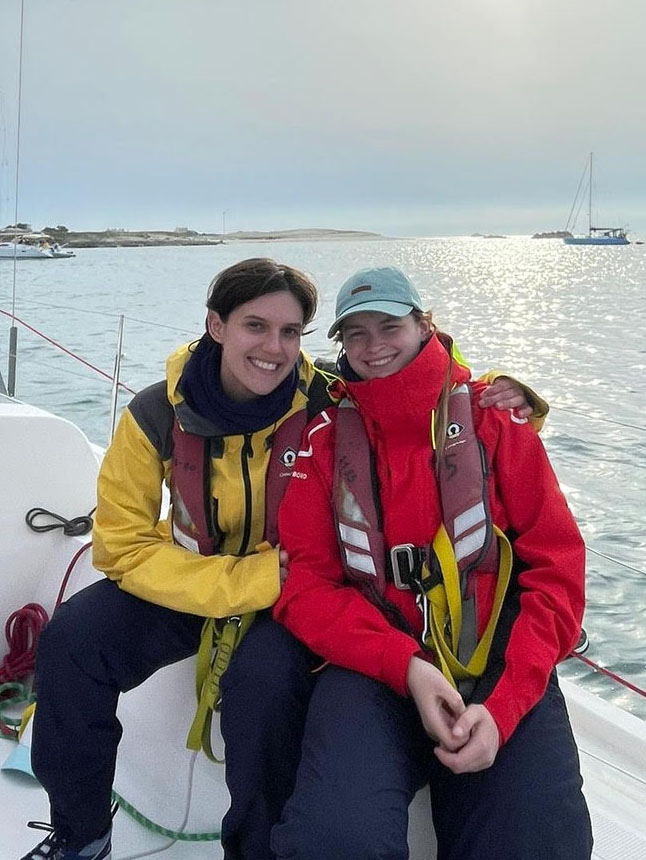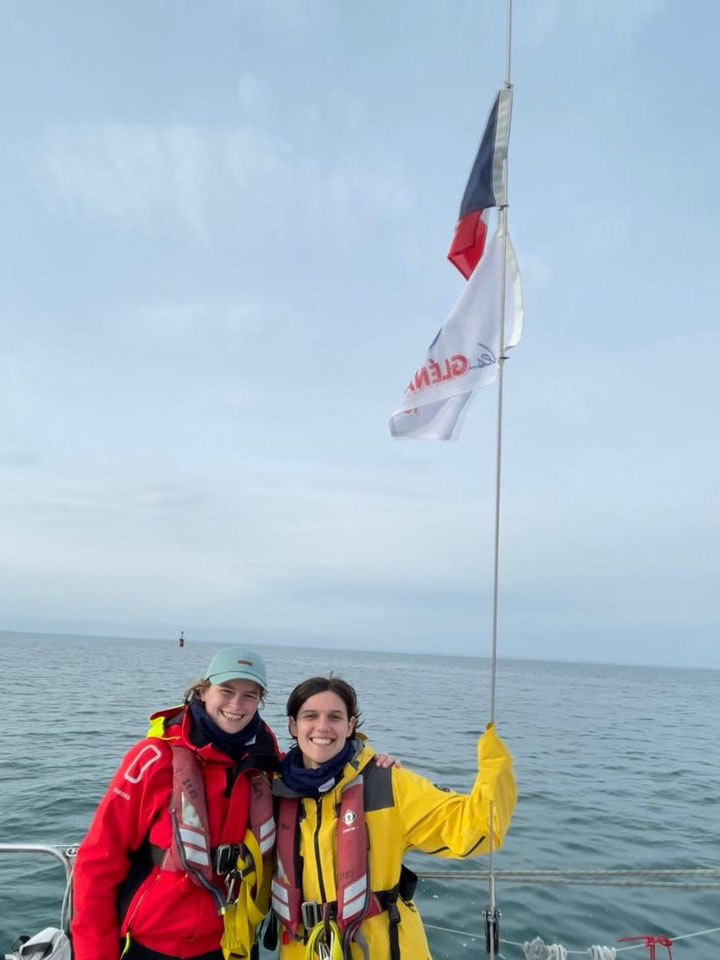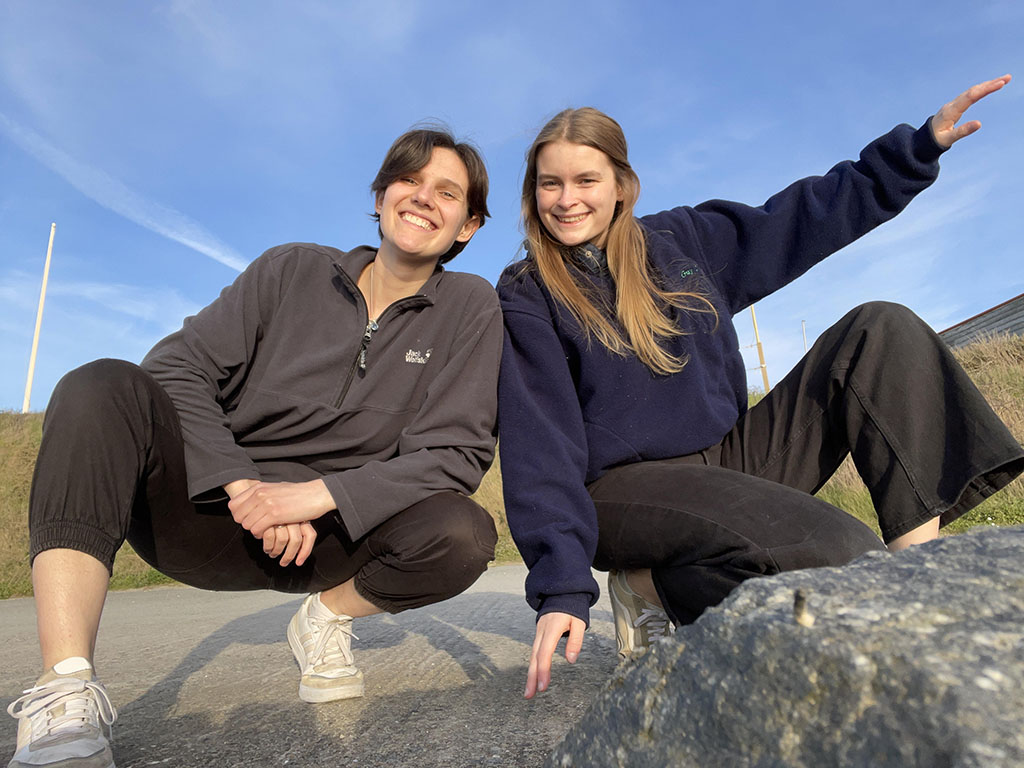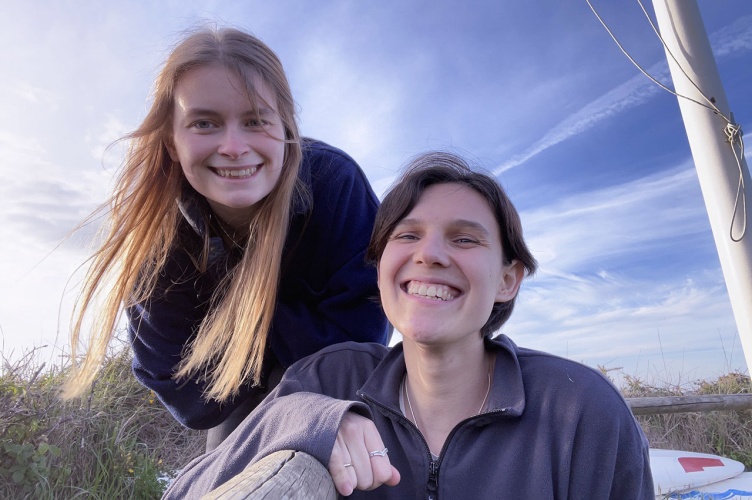Meet the Climate Captains: Two ESCP students take to the sea for a gap year dedicated to impact
Sailing is oftentimes a great metaphor for life: weathering the storm, riding the waves or knowing how to change course in the face of imminent danger. For the Climate Captains, the metaphor applies to overcoming the challenges of putting together an ecological initiative from start to finish.

On a journey into the heart of climate change awareness, ESCP Business School students Alix du Halgouët and Léa Morrier are navigating their way. And they are doing it, literally, as they are sailing. Known as the Climate Captains, the two young women will sail along the coasts of France and England from September to December 2023.
During their three-month crossing of the Channel in a zero-carbon sailboat – stearing against harsh weather conditions and strong currents at that time of year– Alix and Léa will meet young people in schools, hospitals and other gathering places to raise awareness about climate change. They will not only talk but also act: by doing beach clean-ups and marine sampling as well as creating a mural to spread the message about the climate emergency.
In the interview below, they reveal how this mission, to be undertaken during their gap year at ESCP, have offered them new leadership skills and opportunities for personal growth.
I am a student at ESCP Business School. As a sailing instructor and environmental activist, my dream is to combine my passions in order to take action.
Learning to plan an itinerary, adapt & manage resources effectively, on and off the boat
The Climate Captains estimate that their three-month expedition will allow them to raise awareness among approximately 6,500 people in 13 different cities and collect nearly three tons of waste. But as the mission develops, the pair is learning as they progress. At the current stage, they are reaching out for partnerships and sponsors, ensuring their expertise and insights contribute to the project's development. LINH, the charity supporting the Climate Captains, is helping to make contact with organisations and communities along the sailing route. Knowing how to build a strong network of sponsors is essential to the project, Alix and Léa explain.
Managing a young and ambitious non-profit organisation also requires a lot of courage: “We sleep, eat and drink LINH, and there are problems to resolve everyday, starting with getting recognition and funding.”
The journey within the journey is a challenge in itself, in which the ESCP students “are gaining important personal development and know-how. The implementation of this initiative requires numerous entrepreneurial and project management skills, such as planning, coordination, communication, resource and budget management, as well as negotiating with stakeholders.”
Making everyone involved part of the shipcrew
The climate crisis highlights the interconnectedness of various systems on our planet, demonstrating that changes in one system can have far-reaching impacts on others. When sailing, the interactions between the atmosphere, ecosystems, biodiversity, ocean and land surfaces are obvious. The solutions to the crisis can be interconnected too. Only Alix and Lea will be at the helm, but their leadership goes beyond the confines of the boat. The Climate Captains show they can involve everyone in the project as part of the shipcrew.
Partners, audience, sponsors are all considered actors of the mission, and by documenting the journey on social media, we want to make everyone part of it.
The Climate Captains goal, during and after the sail run, is to promote eco-friendly practices and teach the steps individuals and communities can take for a greener future. Alix explains how they’re putting this mission in action:
- Onboard, they’re collecting marine samplings, in partnership with Oceaneye, in order to analyse the amount of plastic particles in the sea.
- On land, they’re organising eight beach clean-ups at the ports of call of the journey, using equipment provided by Surfrider. And to involve the widest possible audience, they are participating in seminars and workshops and the creation of a climate mural involving different communities, like schools and hospitals, townhalls and museums with free tickets for all age groups. It explains the causes and consequences of climate change, insisting on the need to act now and showing the impact every one can have when acting together.
Overcoming obstacles and changing conditions: a hands-on exercise in management
Sailing requires constant adaptation to changing weather conditions, tides, and unforeseen circumstances. Just as we must adapt to our changing climate. Similarly, developing a mission involves the need to adapt to the ever-evolving external environment.
For Alix and Léa, sailing expeditions are an amazing way to raise awareness of the climate crisis : “ if leadership is showing the way, choosing to sail is promoting a sustainable transportation method that does not emit greenhouse emissions, much like cycling or walking. It demonstrates the importance of reducing carbon emissions and the need to transition towards more sustainable forms of transportation, and more generally, a more sustainable lifestyle. ”

But for the two ESCP students and sailors, it is also a challenging and adventurous way to travel, where on board they need to ensure that all goes to plan : “ we are prioritising safety. In order to prevent any potential danger, we have planned a route adapted to our abilities and we will ensure that both of us are capable of managing the boat alone.”
Sailing also offers a unique perspective on the world and can help people understand the interconnectedness of different ecosystems and the impact of climate change on them , says Léa. By sailing across the ocean, people can witness how the ocean, the atmosphere, and the land interact and influence each other.
18 million tons of plastic are dumped into the ocean every minute. As avid sailors, we witness the devastating effects of plastic pollution firsthand.
We can all be students willing to learn new ways to navigate challenges
The Climate Captains' ambitious mission not only aims to make a positive impact on the environment but also serves as a valuable learning experience for Alix du Halgouët and Lea Morrier. As they navigate challenges and take action, they are gaining new skills and continuously learning, emphasising their role as students in this journey.

“ It goes both ways and it already has a positive impact on us. We’re gaining new skills and learning as we go, we’re still students! During this mission and afterwards, we will stick to our goal of educating people and fostering a proactive approach towards protecting the environment. By going places and meeting people, involving them in our events, we can tackle the lack of awareness. So, the positive impact is to be measured by how much we can learn and how much we can teach. ”
And by sharing their experience with others, Alix and Léa’s proactive approach towards the environment can inspire everyone to learn new ways of doing. The true measure of the positive impact of their mission lies in the knowledge they acquire and the knowledge they impart. The expedition extends far beyond sailing: providing a compass that guides them both at sea and on land, turning the entire experience into a shared adventure for all who will join them along the way.
Campus
